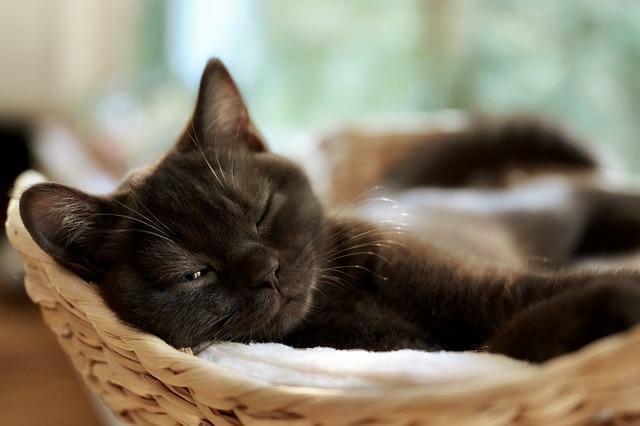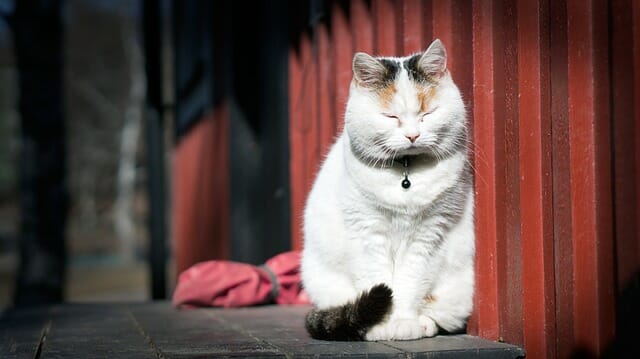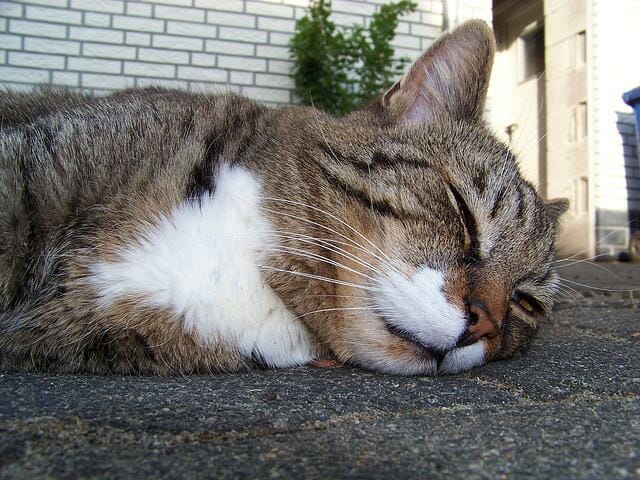How Long Do Cats Stay Pregnant: What You Need to Know About Cat Pregnancy
Cats typically stay pregnant for around 63 to 65 days. However, the exact length of pregnancy can vary depending on the cat’s breed, age, health, and the number of kittens in the litter. Therefore, it’s important to monitor pregnant cats closely during the last few weeks of pregnancy and to provide them with a comfortable and safe environment for giving birth.


Table of Contents
Stages of Feline Pregnancy
Early Stage
During the early stage of feline pregnancy, which lasts 3 to 4 weeks, several changes occur in the cat’s body. After mating, the male cat’s sperm fertilizes the female cat’s eggs, moving down the oviducts towards the uterus. The fertilized eggs implant into the uterus lining, where they will continue to develop into kittens.
The cat’s body produces hormones such as progesterone, which helps to maintain the pregnancy and prepare the body for the upcoming birth. The cat may become more affectionate or distant and experience mild symptoms such as vomiting, loss of appetite, or lethargy. There may not be any visible physical changes to the cat’s body during the early stage of pregnancy. Still, a veterinarian may be able to detect pregnancy through a physical exam or ultrasound.
Fetal Development
Fetal development in cats is a complex and highly regulated process that involves the growth and maturation of the developing kittens. Here are some of the key milestones in feline fetal development:
- Weeks 1-2: After fertilization, the fertilized eggs divide rapidly as they travel down the oviducts and into the uterus. By the end of the second week, the embryos will have implanted into the uterine lining.
- Weeks 3-4: During this period, the kittens’ major organs and body systems begin to form. The heart starts beating, and the kittens develop their eyes, ears, limbs, and spinal cords.
- Weeks 5-6: The kittens’ bodies continue to grow and develop rapidly during this period. They begin to develop their fur, and their sex organs differentiate.
- Weeks 7-8: By the end of the eighth week, the kittens are fully formed and ready to be born. They are fur-covered and have fully formed limbs, organs, and senses.
Middle Stage
During pregnancy, a cat’s metabolism changes, and her body works to provide nutrition for the developing kittens. This often leads to an increased appetite. In addition, the cat’s body requires more energy and nutrients to support the growth and development of the kittens.
The cat may start to exhibit nesting behavior, such as seeking out a quiet and comfortable place to rest or beginning to prepare a nest for the upcoming birth. Also, the cat may become more protective of her belly and more vocal or affectionate as she approaches the end of her pregnancy.
Late Stage
During the late stage of feline pregnancy, which lasts for about 2 to 3 weeks, the cat’s body prepares for the birth of her kittens:
- Nesting behavior: The cat may become restless and seek a quiet, comfortable place to give birth. She may also begin to arrange bedding and other materials to create a nest for her kittens.
- Physical changes: The cat’s belly will be noticeably large and may start to sag or droop as the kittens shift into position for birth. Her nipples may also become enlarged and may start to leak milk.
- Behavioral changes: The cat may become more vocal, restless, or agitated as she approaches to labor. She may also start to groom herself more frequently or become more withdrawn.
- Contractions: According to VCA Animal Hospital, as labor approaches, the cat’s uterus will begin to contract, preparing for the birth of her kittens.
- Delivery: The cat will go into labor, with each kitten being born in a fluid-filled sac. The mother will then break open the sac and clean her kittens to help stimulate their breathing.
Health and Safety Considerations for Pregnant Cats
Veterinary Care
When a cat becomes pregnant, hormonal changes can cause notable changes in its body. The cat’s nipples may become larger, more prominent, and may even darken in color. These changes prepare the cat’s body for caring for the kittens after birth. It is important to monitor the condition of the cat’s nipples throughout the pregnancy and consult with a veterinarian if any abnormalities or concerns arise.
Veterinary care is essential to ensuring the health and safety of a pregnant cat and her developing kittens. Regular prenatal check-ups with a veterinarian can help identify any potential health issues or complications that may arise during pregnancy. In addition, the veterinarian will monitor the cat’s weight, nutrition, and overall health during these check-ups.
Vaccinations and parasite control are important to protect the mother and her kittens from infectious diseases. Your veterinarian can advise which vaccines and parasite control methods are safe during pregnancy. A veterinarian can stand by during delivery to provide medical assistance if needed. After delivery, a veterinarian can examine the mother and her kittens to ensure they are healthy and identify any medical issues.
Nutrition
Proper nutrition is essential during pregnancy to ensure the health and well-being of the mother cat and her developing kittens. Choose a portion of high-quality cat food formulated for pregnant or nursing cats. These foods are designed to provide the necessary nutrients for the mother and her kittens.


Protein is essential for the growth and development of kittens. Pregnant cats need more protein than adult cats, and the protein source should be high quality. Fat is important for energy and the proper absorption of vitamins. Pregnant cats need more fat than adult cats, but monitoring their weight gain is important to avoid excessive weight gain.
Carbohydrates provide energy and fiber, but it’s important to avoid foods that contain many filler ingredients, such as corn or wheat, which have little nutritional value. Pregnant cats need additional vitamins and minerals like folic acid, iron, and calcium. These can be provided through high-quality cat food or supplements prescribed by a veterinarian.
Also, pregnant cats must always have access to clean water. In addition, dehydration can lead to health problems for the mother and her developing kittens.
Parasite Control
Parasite control is important during pregnancy to ensure the health and well-being of the mother cat and her developing kittens. For example, fleas can cause itching, skin irritation, and anemia in pregnant cats. Consult with your veterinarian about safe and effective flea control methods that are appropriate for use during pregnancy.
Ticks can transmit diseases to pregnant cats and their developing kittens. Consult your veterinarian about safe and effective tick control methods for pregnancy use. Intestinal parasites, such as roundworms and hookworms, can be transmitted from the mother to her kittens before birth or through the milk during nursing. Consult your veterinarian about safe and effective deworming methods during pregnancy.
Heartworm can cause serious health problems in pregnant cats and their developing kittens. Consult with your veterinarian about safe and effective heartworm prevention methods that are appropriate for use during pregnancy.
Stress Reduction
Stress reduction is important during pregnancy to ensure the health and well-being of the mother cat and her developing kittens. Here are some tips to help reduce stress in pregnant cats:
- Provide a quiet and comfortable environment: Pregnant cats should have a quiet and comfortable place to rest where they can feel safe and secure. Provide a cozy bed or nesting box in a quiet room where the cat can rest undisturbed.
- Minimize disruptions: Avoid sudden changes to the cat’s environment or routine, which can cause stress. Minimize disruptions and maintain a consistent routine as much as possible.
- Play and socialization: Pregnant cats should still have opportunities to play and socialize with their owners, but monitoring their activity and avoiding rough play or overexertion is important.
- Avoid overcrowding: Overcrowding can cause stress and increase the risk of infectious diseases. Pregnant cats should have plenty of space to move around and avoid contact with other cats.
- Consider pheromone therapy: Feline pheromones like Feliway can help reduce cat stress. These products mimic the pheromones that cats produce naturally to help them feel safe and secure.
- Consult a veterinarian: If the cat seems excessively stressed or anxious, consult a veterinarian. They can help identify the cause of the stress and recommend appropriate interventions, such as behavioral therapy or medication.
Vaccinations
Vaccinations are an important part of preventative care for pregnant cats. Vaccines help protect cats from infectious diseases that can harm the mother cat and her developing kittens. However, it’s important to consider the potential risks and benefits of vaccination during pregnancy.


Before vaccinating a pregnant cat, consult with a veterinarian. They can help determine the appropriate vaccination schedule based on the cat’s needs and health status. Vaccinations should be given before pregnancy whenever possible. For example, suppose a cat needs to be vaccinated during pregnancy. In that case, waiting until the middle of the pregnancy (around 4-6 weeks) is generally recommended to minimize potential risks to the developing kittens.
Some vaccinations, such as those for feline leukemia virus (FeLV) and feline infectious peritonitis (FIP), may be riskier during pregnancy and should be avoided unless necessary. Other vaccinations, such as those for rabies and feline viral rhinotracheitis (FVR), are generally considered safe during pregnancy.
If a cat is due for a booster vaccination during pregnancy, it may be best to wait until after delivery to give the booster unless the cat is at high risk for disease. Vaccination during pregnancy should be avoided if the cat is not in good health, as this can increase the risk of adverse reactions.
